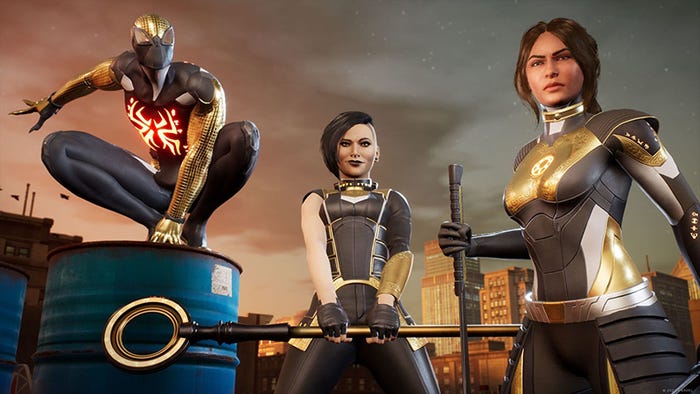Why No Female Soldiers?
Kotaku proffered that there is a lack of virtual female soldiers in video games chiefly because it's too much work to create the extra models needed to display female counterparts. I argue that it's a real world issue, and explore the deeper question.

From the Kotaku story:
"Video games can sometimes be accused of being behind the times in regards to social issues and minority representation. That women can't even fight in 2010 war games such as Bad Company 2 and MAG — even as real women reportedly serve admirably in the real military — would seem to be retrograde, but maybe the tech excuse is a good one."
In the HBO miniseries Generation Kill, the protagonists' Recon Marine convoy is at one point hit by small arms fire from an adjacent road during the night while on the move. After realizing they are drawing friendly fire, one of the Marines yells with exasperation "Fuckin' pogues!" When embedded reporter Evan Wright's character queries the meaning of "pogue" one of the younger Marines responds "Persons other than grunts -- pussies."
In the American military -- the military force of the current world superpower, our modern day Roman legions -- females are not permitted in frontline combat roles. The Canadian military (and others, such as Israel and other defense-oriented armies) do allow it, but these forces are a bit different in their operational persona. Canada is a small peace keeping force, and Israel, like the former Soviet Union, once needed all the personnel it could muster.
The American Army is an expeditionary force -- an aggressive invasion force. It has been, especially the Marine Corps, from the start.
And let's face it, even if the ladies would like to kill and be killed next to the boys, the current theatre of war is probably not the best place to start.
From the Israeli government site:
"Soon after the establishment of the IDF... the removal of all women from front-line positions was decreed. Decisive for this decision was the very real possibility of falling into enemy hands as prisoners of war. It was fair and equitable, it was argued, to demand from women equal sacrifice and risk; but the risk for women prisoners of rape and sexual molestation was infinitely greater than the same risk for men."
In British IED specialist Chris Hunter's account of his two month service in Iraq, he recalls a story of British interference with local affairs. Soldiers on patrol came across a little girl, and perhaps stared at her too long. Her father ran into the street and dragged her away -- he then proceeded to beat her. The soldiers, thinking with Western morals, grabbed the man and beat him twice as hard. The next day they patrolled the area the man came out into the street with his daughter and slit her throat.
It makes sense then that insurgents are not likely to surrender to female troops. As well, Lt. Col. Dave Grossman (although proven incorrect time and time again on other issues) offers some interesting thoughts on male pyschology in that the treatment of wounded women in a war zone might set men off-kilter. The paraphrasing via Wikipedia reads: "The reason for removing female soldiers from the front lines is no reflection on the performance of female soldiers, but that of the male infantrymen after witnessing a woman wounded. The IDF saw a complete loss of control over soldiers who apparently experienced an uncontrollable, protective, instinctual aggression."
Training in The Boys Club to be a Killer
When I was at film school we had a short fight class, with the guy who did the choreography for Highlander. This guy was Force Recon in Vietnam, and I remember one day he said to us that at the end of the day, even in modern warfare, it can come down to two men, knives and fists. During training they had what was called the "bear pit". This was about a platoon worth of soldiers shoved into a muddy pit and told to fight until one man "won". I forget whether he did well or not, but I do remember he recalled being knocked out cold during it.
It would surprise me if men would be willing to beat up women during intense combat preparedness training. And it would surprise me if the American military were interested in watering down their training of professional killers to appease...anyone.
In effect we sit back in our armchairs and gesture at the military institution "Why are women not treated equally, why are they not treated like men?" Simply, because they are not men. The rest of the world is not so liberal. War is not so liberal -- neither is the training. We do not see female Marines in Call of Duty because there are no female Marines. There is no reason to fret over the resources required for female soldier models, because none of the conflicts the Western videogame industry is modelling feature them.
What is The Real Issue For Us?
We do not glorify the female top gunner defending a water truck behind the lines -- we glorify the testosterone-driven adrenaline-pumped, sleep-deprived sweaty twenty year old male grunt lying in the dirt with his M16 as rifle rounds pop and zing overhead.
But , more to my point here, there is the general thinking, I believe, that the game industry is sexist. Because the industry is predominantly male and because we're stereotypically "asocial misanthropes" who enjoy a dark basement and an FPS rather than a day at the golf course, it is assumed that a shortage of females in the industry and in the games it creates is solely due to deep-seated sexism funded by a history of supposed social problems and spite.
At a local event here in Vancouver, a precursor to having our own branded GDC, the question was asked during a QA "Why so few females in videogames?" The official answer was rather lukewarm and empty, but someone speaking from the crowd offered that there are so few women in the industry because so few apply -- many with the skillsets; usually art-related, get higher paying jobs in film. The majority probably aren't interested, rather than the industry discriminating.
Kotaku's Stephen Totilo posits "Do female characters need to be put in virtual combat? Or, more to the point, are they more important than crumbling walls?"
I would say perhaps they should. Perhaps, aside from main characters (of which there are already some, in the soldier role), the grunts in an FPS should be female. But who are we kidding -- how weird would that seem? Like Totilo's assumed stance of towing the female line, it would be an awkward formality. As long as there are very few cases of females serving in frontline combat roles, female combatants will remain the stuff of Vietnam era sci-fi, Aliens, and Stalingrad films. Otherwise it is nothing but a cheap nod for the sake of being politically correct.
It is the cornerstone of Buddhist policy that beneath it all we are just one thing: humans. Humans minds influenced by human bodies. But this is not true of the cultures we live in, and those cultures produce real effects that are not just modifiers of perception but of the circumstances we observe themselves. As equal as we would like to believe men and women are as human beings, they are not equal in their roles in the world. If those roles should be or can be changed or not is not an issue for me to speak to, but the depictions of them in entertainment should not be blamed on the depictors.
Read more about:
BlogsAbout the Author(s)
You May Also Like













